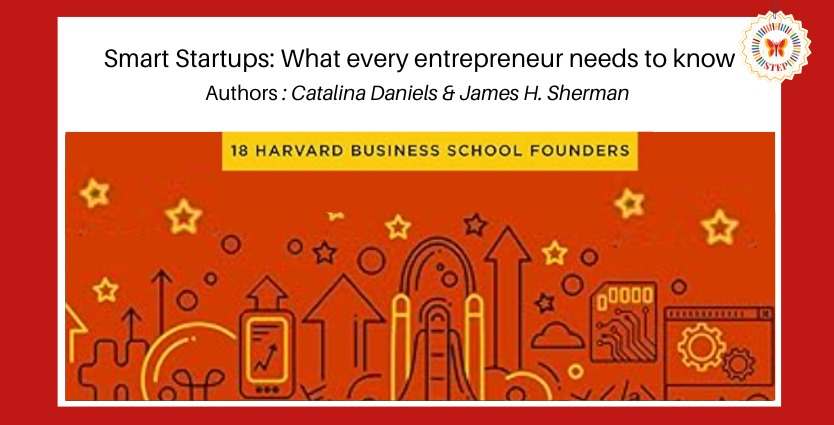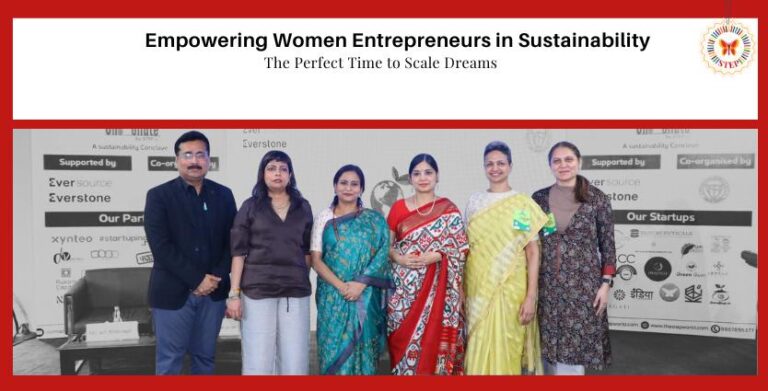Success Mantras from Experienced Entrepreneurs
Starting a business is hard. 70% of startups today fail after their seed round, and less than 10% percent achieve success for founders and investors. Aspiring entrepreneurs need all the advice, wisdom, and inspiration they can.
Catalina Daniels, a Harvard Business School and the Free University of Brussels graduate with seventeen years at McKinsey & Company, partnered with James H. Sherman, who graduated from Harvard Business School and Stanford University, to glean insights from 18 Harvard Business School graduates and entrepreneurs.
The duo sought to uncover the realities of founding companies like Blue Apron, Rent the Runway, Gilt, and AdoreMe, dispelling myths and providing essential knowledge for aspiring entrepreneurs in their book, “Smart Startups: What Every Entrepreneur Needs to Know- Advice from 18 Harvard business school Founders.”
The book challenges assumptions, destroys preconceived notions, crystallizes hunches, and articulates perceptions.
The book is a timeless record of essential knowledge that can help entrepreneurs avoid failure and succeed.
The 5 Key Insights:
There is no random “lightbulb” or “aha” moment. Landing a good idea requires a deliberate, lengthy ideation process:
Daniels and Sherman discovered that successful entrepreneurs only stumbled upon their ideas after a while. Instead, they engaged in a deliberate, lengthy ideation process, shaping and evaluating ideas over weeks and months. Whether through systematic evaluation or organic development based on personal experiences, the key takeaway is that even seemingly spontaneous ideas require significant time and effort for refinement.
As Josh Hix explains,” This involves deep reflection, examining problems, looking for solutions, and it’s not some linear or magical process.”
Many founders came up with the idea based on their own experiences and refined it over time. For example, the founder of Zumper got frustrated trying to rent apartments and close on a lease, so he slowly developed the idea for an end-to-end rental platform.
Ideas take time to shape and evaluate. It’s like peeling an onion—the idea emerges in layers over an extended period.
The Ideation Triangle
What makes a good startup idea? Three factors came up again and again independently in the founder interviews.
- A Large market opportunity: You need to identify an opportunity. That doesn’t just mean there’s a huge potential market out there. A large market is not the same as a large opportunity. More importantly, your business has to solve a real problem that people are dealing with. Henry the Dentist founder Justin Joffe explained that when he looked at the dental industry, he saw a massive $125 billion market where many people with insurance weren’t going to the dentist. It showed him a sizable opportunity to solve a problem with his mobile dental clinic. Most successful founders don’t reinvent the wheel but reinvent existing products and services by improving convenience and cost.
- Relevant founder skills: As the founder, you need the right skills to understand your customers and run that business. You don’t necessarily need direct experience in the industry you’re targeting. Many of the founders suggested that industry experience can make you less innovative. For example, Jenny Fleiss of Rent the Runway explained that coming from outside an industry allows you to approach things without preconceived notions, which can spark more creative thinking. In the case of Rent The Runway, Jenny and her co-founder strongly believed that women would like to rent fashion clothing, particularly for special events. But the concept of renting clothes was entirely new. They reached out to famous fashion designers for feedback, but the initial response was not enthusiastic. But Jenny persevered and kept to the concept, and today, Rent the Runway has raised $450M and has more than 145,000 subscribers.
- A huge amount of passion for the opportunity: Founders have to have passion for the opportunity. It gives the fuel to get through tough times, recruit people to your team, raise money from investors, and sell your product. In the interviews, the founders emphasized that real passion often stems from wanting to make a positive impact on the world. For example, Alexandra Wilkis Wilson of Gilt shared the passion she and her co-founder had for understanding consumer needs and building an innovative fashion company that would excite them.
Validating Demand on a Shoestring Budget
As an idea transforms into a startup, the primary objective is to prove product-market fit. The key is to validate demand as cheaply as possible, emphasizing the development of a minimum viable product (MVP). Founders shared creative approaches to extreme MVP testing, from pop-up shops with borrowed dresses to posting concepts on social media. Validate demand in a capital-efficient manner to maximize learning while minimizing risk. It is important to build the simplest “front end” to start. The front end is the product or what customers perceive to be the product.
The founders of Yumble Kids posted their kids’ meal concept on Facebook mom groups. After receiving overwhelmingly positive feedback, they took orders from a few interested customers and cooked and delivered the meals from their home kitchen. As the co-founder David Parker explained, this allowed them to prove demand before investing in a commercial kitchen and delivery operation. By focusing on the front end, you can validate customer demand for your startup before over-investing in technology and operations.
Founders also talked about the importance of generating early buzz and press coverage to drive interest before spending on marketing. For example, Bespoke Post gained 400 subscribers overnight from a free feature in a national email newsletter.
Fundraising doesn’t equal success
Always be as capital-efficient as you can be. Fundraising is a huge topic in the startup world, and there are many considerations to raising outside funds. Founders advise bootstrapping in the early stage for as long as possible to prove the model before pursuing outside financing. This allows you to gather data, refine the product, and demonstrate traction to raise on better terms later with more credibility.
As Anna Auerbach, the founder of Werk suggests, don’t raise early on an unproven idea. Werk was not yet a proven idea, and they burned through too much capital on experimentation. In growth rounds, after you have traction, be very thoughtful about the amount you raise. You should strive to raise the right amount—not the most you can. “Death by overfunding” can lead entrepreneurs to lack discipline in growth and operations. They may hire too fast, overinvest in unproven tactics, and push unprofitable revenue growth. The right balance on the amount depends on your specific business model and goals. Raising too much will result in dilution, but too little might lead to continuous raising. By the time of your growth-stage financing, your milestones will help you define when and how much to raise. Companies targeting massive scale need significant capital for infrastructure and marketing, while others can grow efficiently with less.
Culture is what people do when you’re not around
When hiring people for your company, it’s not just about finding those with the right skills and experience. Many successful business founders from Harvard Business School (HBS), stress the importance of considering cultural fit. In this context, culture refers to the shared values and behaviors that guide a company.
Entrepreneurs highlight that building a positive culture is crucial from the beginning. Culture acts like the DNA of a company, ensuring that everyone is moving in the same direction. However, creating the right culture isn’t easy—it’s something you learn on the job rather than from books.
Founders advise focusing on culture right from day one. According to Morgan Hermand-Waiche of AdoreMe, the founders play a significant role in setting the tone by expressing their values and actions early on. Defining and communicating your company’s values in the early stages is critical because the behaviors and words, in the beginning, establish norms that can be challenging to change later.
Anthemos Georgiades of Zumper emphasizes that while intelligence (IQ) is crucial, cultural fit is the key reason for hiring. Skills can be taught, but values are inherent to an individual.
As your company gets bigger, it’s essential to keep talking and working together about your beliefs. The onboarding process- when new hires get introduced to the company, becomes a crucial opportunity to ensure that they understand and embody the values you expect. Other chances to reinforce these values include team gatherings, town hall meetings, annual retreats, and even visual cues like posters in the office. The goal is to keep everyone on the same page and maintain a positive and cohesive company culture.
Bringing It All Together
“Smart Startups” is more than a book; it’s a guide for new entrepreneurs. It helps you navigate the exciting but challenging startup journey. It challenges your thinking, encourages action, and invites you to start turning your dreams into successful businesses.



